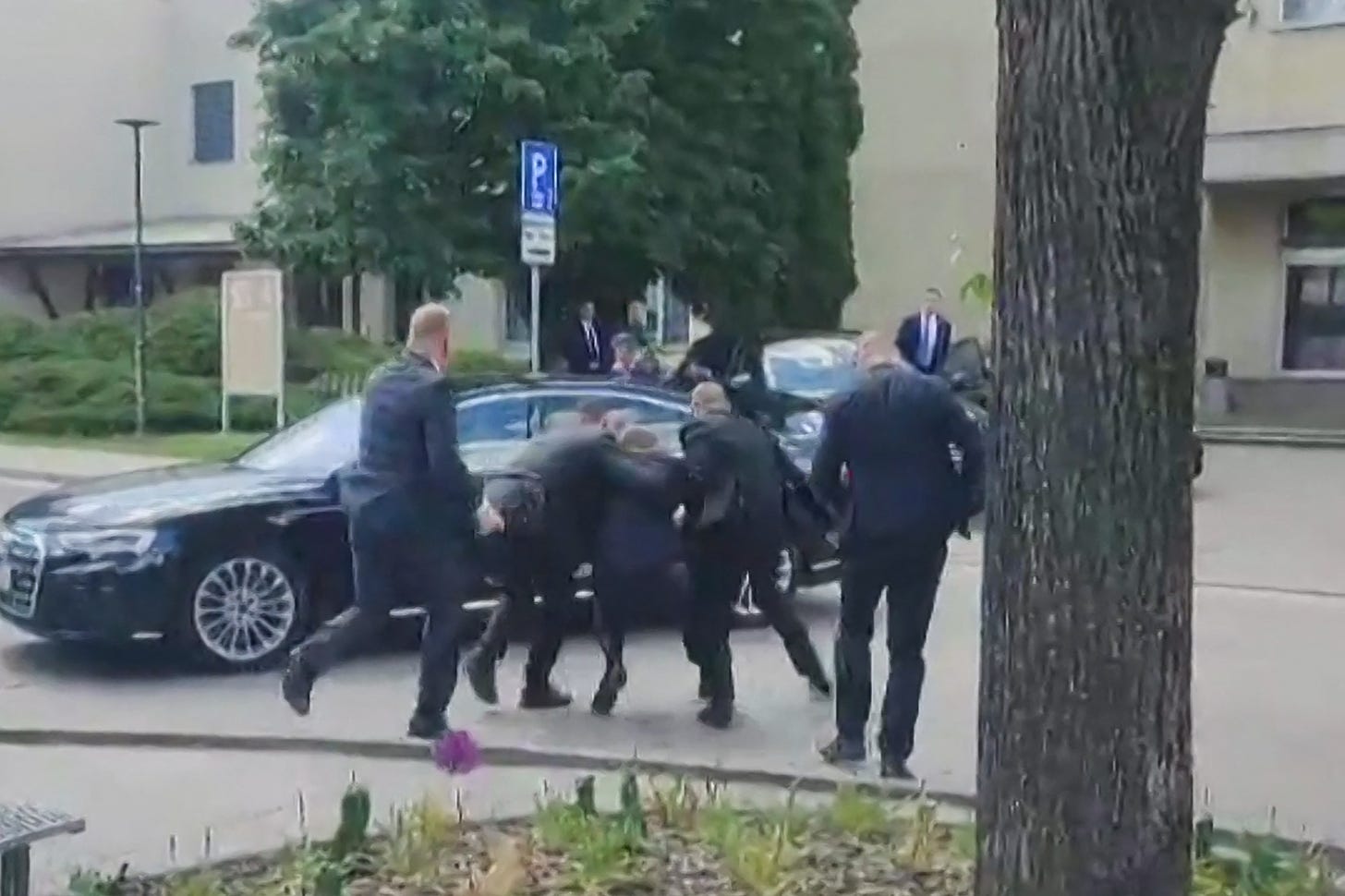It Could Happen Here Too
How would America and its institutions respond to an attempted political assassination?

SLOVAKIA HAS A POPULATION OF JUST 5.6 million, and it feels even smaller—like a provincial town where everyone knows each other. Political assassinations seemed outside of the realm of possibilities in a quintessentially parochial country—at least until Wednesday, when someone shot Slovakia’s pugilistic, leftist-populist, pro-Russian prime minister, Robert Fico. While he seems likely to survive his multiple injuries, the damage to the collective psyche, political culture, and institutions may be permanent.
Maybe the shock of this attack will be enough to rescue Slovakia from its self-sabotaging, cynical, populist political spiral—though that seems unlikely. If anything good can come from this attempted murder, it might be that it serves as a warning to others, including the United States. What happened in a small mining town in central Slovakia this Wednesday can happen here, too. While it’s not yet clear how the attempted assassination is going to scramble Slovakia’s democracy, we can imagine what an attempted assassination would do to American politics.
Political polarization is higher in the United States than it is in Slovakia. Moreover, the stakes of U.S. politics are greater than those of a tiny democracy on the EU’s periphery. For all its contentious politics, the most violence Slovakian politicians had seen before Wednesday was a fight between a drunk deputy speaker of parliament and a lamp post. In America, by contrast, political protests have degenerated into violence with increasing frequency—and firearms are ubiquitous.
SO FAR, EVIDENCE SUGGESTS that Fico’s would-be assassin, Juraj Cintula, a 71-year-old retiree, acted alone. A former security guard at a supermarket and a writer of (bad) poetry and fiction, it seems safe to assume that he has been marinating in online cesspools. In 2016, he had engaged with a group called Slovak Conscripts, a Russian-trained quasi-militia which was later disbanded. Cintula reportedly urged them to embrace pacifism, a theme that he later repeated in his YouTube videos, expressing fears of widespread violence. He even attempted to start a political party, which he called “A Movement Against Violence.” At different points in time, Cintula seemed concerned about immigration, Slovakia’s Roma community, and Russia’s aggression against Ukraine.
Following Fico’s return to power last year, Cintula was seen at public protests against the government’s changes to the criminal code, which critics argued would enable government corruption and undermine the rule of law. In a short video made after his arrest, he lambasts the government’s attack on the independence of Slovakia’s public broadcaster.
A liberal-minded pacifist seems like an unlikely assassin. Clearly, at some point, Cintula decided that the only way to achieve nonviolence was through violence, either by eliminating Fico or, somehow, by using his dramatic crime to demonstrate something. Something radicalized him. There are doubtless many such confused and agitated people on both sides of the Atlantic, their mental balance upset by the torrent of catastrophizing that has become the centerpiece of our political life.
Fico himself has been a major contributor to the cycle of polarization and decline of civility in Slovak politics. He consistently depicted his political opponents as enemies, morally suspect, controlled by the U.S. Embassy in Bratislava, George Soros, and/or by foreign capital. Fico, in short, has often played to his base’s fear and anger, just like Donald Trump and so many other American politicians. The problem, however, is that the mob’s emotions are not always controllable, nor are reactions to it.
Trump’s depredations have driven many otherwise smart, even-keeled people to the point of irrationality if not insanity. Is it a stretch to imagine that a victory for Trump in November—or a repetition of his election-denialism from 2020 and 2021—would push some Americans with access to guns right over the edge?
IT’S HARD TO PREDICT HOW SUCCESSFULLY a political system will cope with a stress test of this kind. A Reichstag fire scenario may sound farfetched in the Slovak context. But it is perfectly imaginable that, whether or not Fico makes a full recovery, the governing coalition will seize the opportunity to cement its hold on power in ways that would otherwise be impossible.
The new government’s attack on public prosecutors, blatant abuse of a criminal law reform to protect its cronies, and its defanging of public broadcasting created an atmosphere of democracy crumbling into dictatorship. The government is already preparing a law on “foreign agents” modeled after those in Russia and Georgia, and following Fico’s shooting, some in the governing coalition (arguably from its fringes) accused the opposition and media of having blood on their hands and called for the dissolution of the leading opposition party. How confident can we be that American democracy wouldn’t crack under similar stresses?
Slovakia, like the United States, has a history of restoring and reinventing itself. Following an ugly, semi-autocratic period in the 1990s when then-Secretary of State Madeleine Albright dubbed the country the “black hole of Europe,” Slovakia embarked on a program of radical reforms, catching up with its neighbors and turning into the fastest-growing European economy. For all its flaws, the Slovakia in which I grew up and which I know, remains a decent country.
Here’s hoping for a swift recovery—for Fico, for Slovakia, and for democracy. Maybe the trauma of an attempted assassination will draw the country together. Maybe Slovakia can be an example to other, larger democracies struggling with excessive polarization, distrust, and a breakdown of social bonds—including our own.





